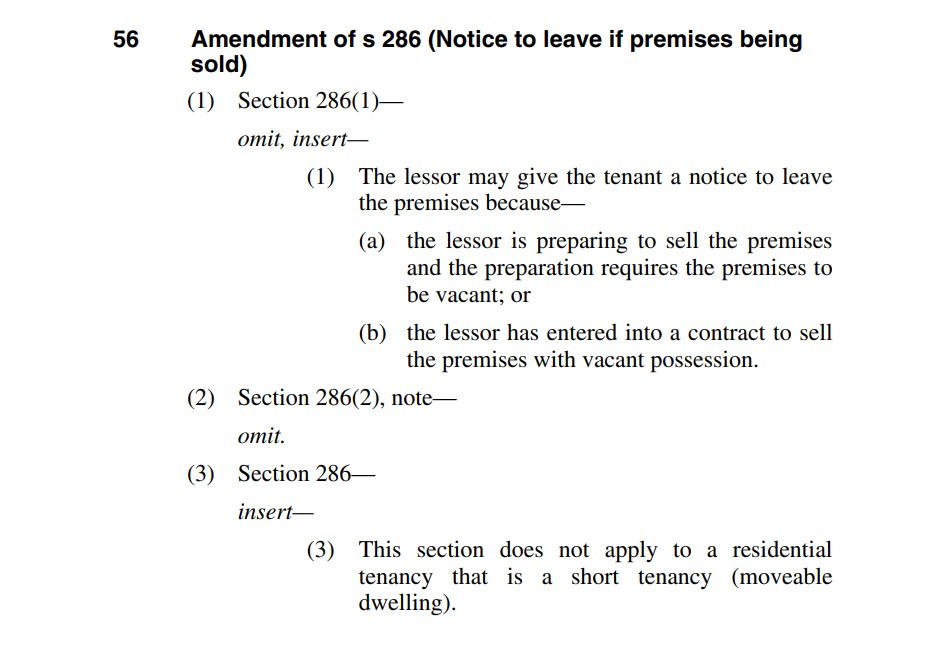
Recently, significant legislative changes have been introduced to empower tenants and bring greater transparency and accountability to the tenancy termination process. One crucial aspect of these changes is the prevention of lessors from terminating a tenancy without valid grounds. Instead, they will be required to rely on a well-defined set of specific stated grounds provided in the legislation to bring a tenancy to an end.
Below, we will explore the key elements of these legislative changes, diving into the expanded suite of specific stated grounds that lessors must now adhere to when seeking to terminate a tenancy.
Lessors will be prevented from terminating a tenancy without grounds and required to rely on an expanded suite of specific stated grounds in the legislation to end the tenancy. This change will provide greater transparency and accountability about lessor-initiated tenancy terminations and support tenants to enforce their rights without fear of retaliatory action.
The additional grounds to end a tenancy available to Lessors will be:
- a fixed-term tenancy agreement is due to expire
- the property is to be vacated so that redevelopment (such as conversion from a house into flats) or demolition of the property can be undertaken
- the property is to be vacated to allow significant repair or renovation works to be undertaken
- the property is subject to a change of use (such as changing from long-term accommodation to short-stay accommodation or holiday lettings)
- the owner or their immediate family needs to move into the rental property
- the rental property has been sold and vacant possession is required
- the property is to be vacated so that the lessor can prepare the property for sale
In each case, the lessor will be required to give the tenant two months’ notice. However, a fixed term tenancy could not end before the contracted end date unless the tenant agreed. The lessor must provide information to accompany the approved form where required, with a penalty provision attached to prevent misrepresentation or misuse.
Tenants will continue to be able to end a tenancy without grounds if the required notice period (two weeks) is observed, and will also have access to a wider range of specific grounds to end the tenancy, varied notice period requirements targeted to the new grounds of:
- the rental property is not in good repair, or does not comply with Minimum Housing Standards
- the lessor has not complied with a repair order of QCAT within the specified time (fourteen -day notice period)
- a co-tenant dies (providing for the tenant to vacate two weeks after the remaining co-tenants give written notice of the end of the tenancy agreement due to the tenant’s death).
SELLING YOUR PROPERTY
- A tenancy agreement does not automatically end when a rental property is sold. The purchaser takes on any agreement in place prior to taking ownership.
- The Lessor must give the tenant a Notice of lessor’s intention to sell premises (Form 10), which includes how they plan to market the property.
- If the selling agent is different from the property manager, the selling agent must give the property manager a copy of each Entry notice before entering the property.
- An open house or on-site auction can only be held if the tenant agrees in writing.
- The Owner must ensure the tenant has quiet enjoyment of the property.
Clause 56 amends current section 286 Notice to leave if premises being sold for residential tenancy agreements.
The current subsection 286(1), which only applies to periodic agreements, is replaced and extends the application to both periodic and fixed term agreements.

It clarifies that the lessor may give the tenant a notice to leave because the lessor has entered a contract to sell the premises with vacant possession. It also includes a new provision where the lessor is preparing to sell the premises and the preparation requires the premises to be vacant.
However, with the amendment of section 286 Notice to leave if premises being sold, legislation has been added to prevent false and misleading information being used on a notice.
Information
On 18 June 2021, the Queensland Government introduced the Housing Legislation Amendment Bill 2021 to the Queensland Parliament.
The Bill was passed by Queensland Parliament on 14 October 2021.
Queensland’s new legislation, which is administered by the RTA, amends the existing legislation:
- Residential Tenancies and Rooming Accommodation Act 2008
- Residential Tenancies and Rooming Accommodation Regulation 2009
- Residential Tenancies and Rooming Accommodation (COVID-19 Emergency Response) Regulation 2020.
Links
- Housing Legislation Amendment Bill 2021
- Residential Tenancies and Rooming Accommodation Amendment Regulation 2022
- You can read more about the intention of the Bill in the Explanatory Notes
- To learn more about the Renting in Queensland rental reforms process, visit chde.qld.gov.au.
- Minister Enoch audio (Dropbox Link)
Key information provided in this blog post has been extracted from the Housing Legislation Amendment Act 2021, the Explanatory Notes and the Residential Tenancies Authority (RTA) website, and is provided as an educational resource only.






